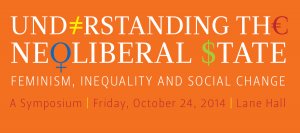Presented By: Institute for Research on Women and Gender
A Symposium: Understanding the Neoliberal State
Feminism, Inequality and Social Change

In recent years, a great deal of academic research has focused on the negative effects of neo-liberalism and neo-liberal economic policies. Such scholarship often presumes the retreat or decline of the state. “Neo-liberalism” in this context often takes on a deterministic and ghostly character – acting as a primary agent that reshapes socio-economic and cultural practices and permeates all forms of political life. However, research in comparative and historical contexts provides a more complex picture of the nature and causes of inequality. States, while restructured in varying ways, continue to play a central role in shaping the causes and responses to inequality. The nature of state formation affects processes of economic restructuring. Social movements that respond to various forms of inequality are immersed in complicated political dynamics with both the state and transnational and national capitalist actors. The objective of this symposium is to move beyond surface invocations of “neoliberalism” and provide an in-depth working group on the nature and practices of the post-liberalization state from historical, comparative and transnational perspectives.
Symposium Schedule
9:15-9:30AM Introductory Remarks
Leela Fernandes, Women’s Studies and Political Science, University of Michigan, “Myths of the Vanishing Neoliberal State”
9:30-11:30AM Panel 1: Restructuring the State, Civil Society and Public Life
Lamia Karim, Anthropology, University of Oregon, “Unsilenced State, Silenced NGOs: The State and the Grameen Bank in Neoliberal Bangladesh”
Ujju Aggarwal, Institute for Urban Policy and Research Analysis, University of Texas, Austin, “The Politics of Choice: Race, Class, Gender and the Structuring of Citizenship Post-Brown Vs. Board of Education”
Nancy Naples, Sociology and Women’s, Gender and Sexuality Studies, University of Connecticut, “What’s in a Word?: Austerity, Precarity, Neoliberalism and Traveling Theory”
Moderator: Victor Mendoza, Women's Studies and English, University of Michigan
2:00-4:00PM Panel 2: State Interventions
Dolly Daftary, School of Social Work, Western Michigan University, " Improvising Governance During Economic Restructuring: Development and State Transformation in India"
Christina Heatherton, American Studies, Trinity College, “When Your Only Tool is a Hammer, Every Problem Looks Like a Nail: Neoliberal Problem Solving From Ferguson and Beyond”
Amy Lind, Women’s, Gender and Sexuality Studies, University of Cincinnati, “After Neoliberalism?: Resignifying Economy, Nation and Family in Ecuador’s Citizen Revolution”
Moderator: Suzanne Bergeron, Women’s and Gender Studies and Social Sciences, University of Michigan, Dearborn
4:30-6:00PM Keynote Address in Rackham Assembly Hall
“The State in the Struggle, the Struggle in the State: Institutional Contradictions Versus Neoliberal Displacements”
Ruth Wilson Gilmore, Professor of Earth & Environmental Sciences, and American Studies and Director of The Center for Place, Culture and Politics,” Graduate Center, City University of New York
Symposium Schedule
9:15-9:30AM Introductory Remarks
Leela Fernandes, Women’s Studies and Political Science, University of Michigan, “Myths of the Vanishing Neoliberal State”
9:30-11:30AM Panel 1: Restructuring the State, Civil Society and Public Life
Lamia Karim, Anthropology, University of Oregon, “Unsilenced State, Silenced NGOs: The State and the Grameen Bank in Neoliberal Bangladesh”
Ujju Aggarwal, Institute for Urban Policy and Research Analysis, University of Texas, Austin, “The Politics of Choice: Race, Class, Gender and the Structuring of Citizenship Post-Brown Vs. Board of Education”
Nancy Naples, Sociology and Women’s, Gender and Sexuality Studies, University of Connecticut, “What’s in a Word?: Austerity, Precarity, Neoliberalism and Traveling Theory”
Moderator: Victor Mendoza, Women's Studies and English, University of Michigan
2:00-4:00PM Panel 2: State Interventions
Dolly Daftary, School of Social Work, Western Michigan University, " Improvising Governance During Economic Restructuring: Development and State Transformation in India"
Christina Heatherton, American Studies, Trinity College, “When Your Only Tool is a Hammer, Every Problem Looks Like a Nail: Neoliberal Problem Solving From Ferguson and Beyond”
Amy Lind, Women’s, Gender and Sexuality Studies, University of Cincinnati, “After Neoliberalism?: Resignifying Economy, Nation and Family in Ecuador’s Citizen Revolution”
Moderator: Suzanne Bergeron, Women’s and Gender Studies and Social Sciences, University of Michigan, Dearborn
4:30-6:00PM Keynote Address in Rackham Assembly Hall
“The State in the Struggle, the Struggle in the State: Institutional Contradictions Versus Neoliberal Displacements”
Ruth Wilson Gilmore, Professor of Earth & Environmental Sciences, and American Studies and Director of The Center for Place, Culture and Politics,” Graduate Center, City University of New York
Explore Similar Events
-
Loading Similar Events...
